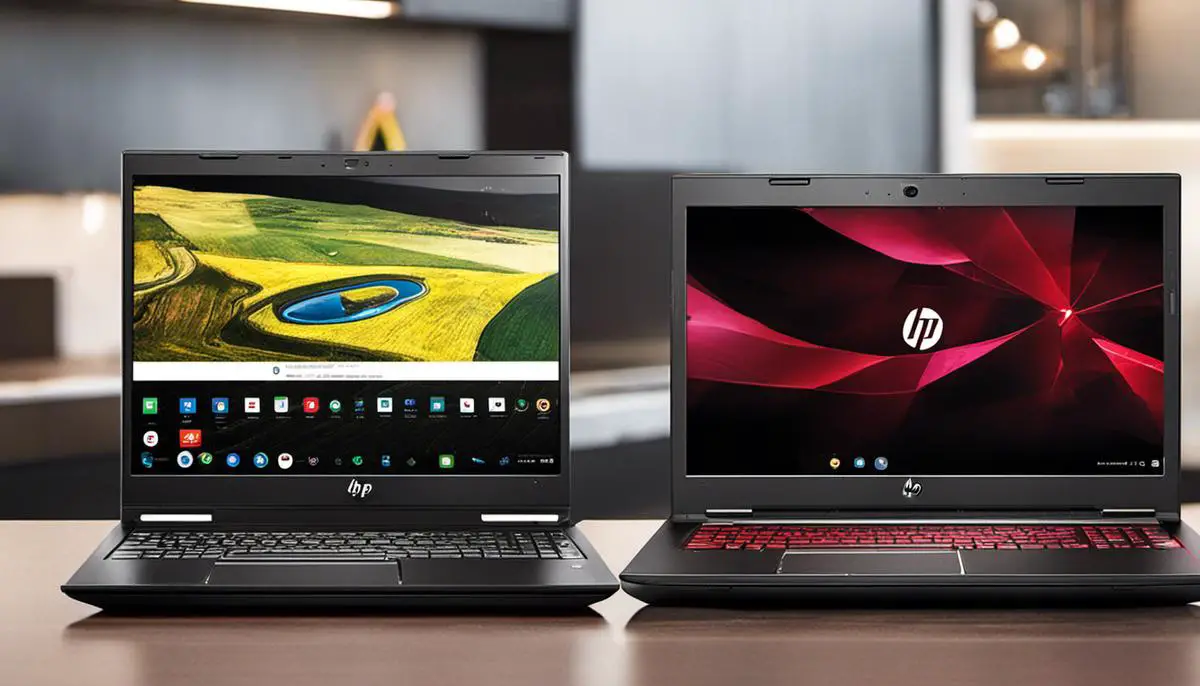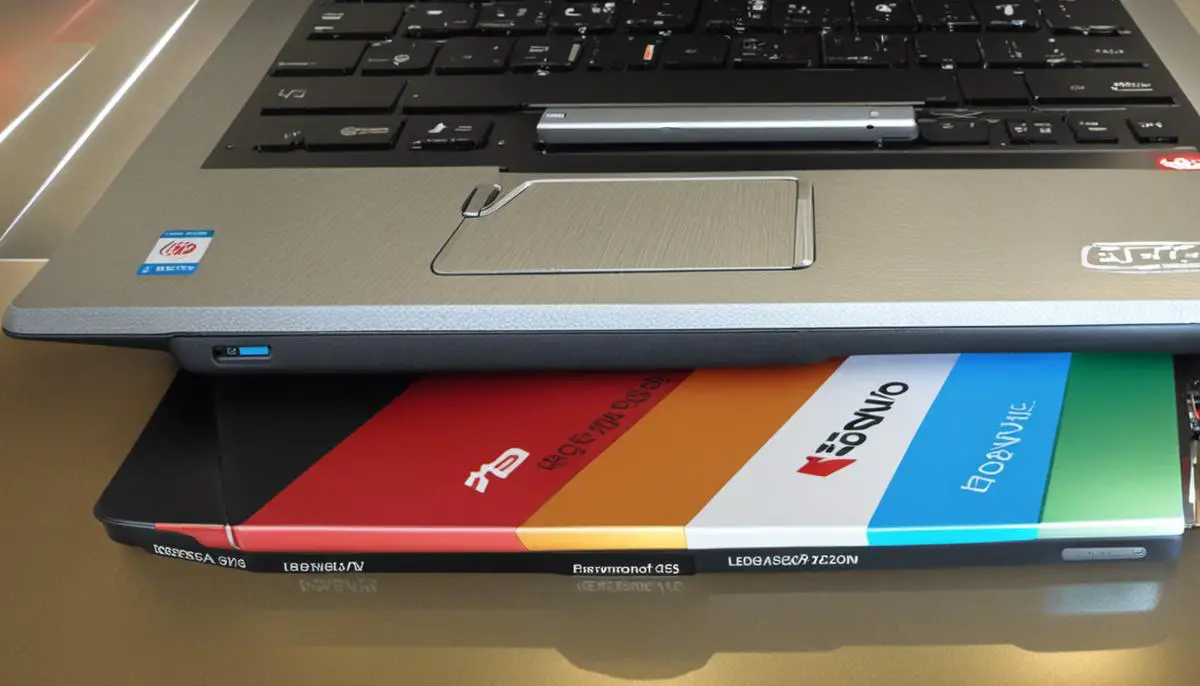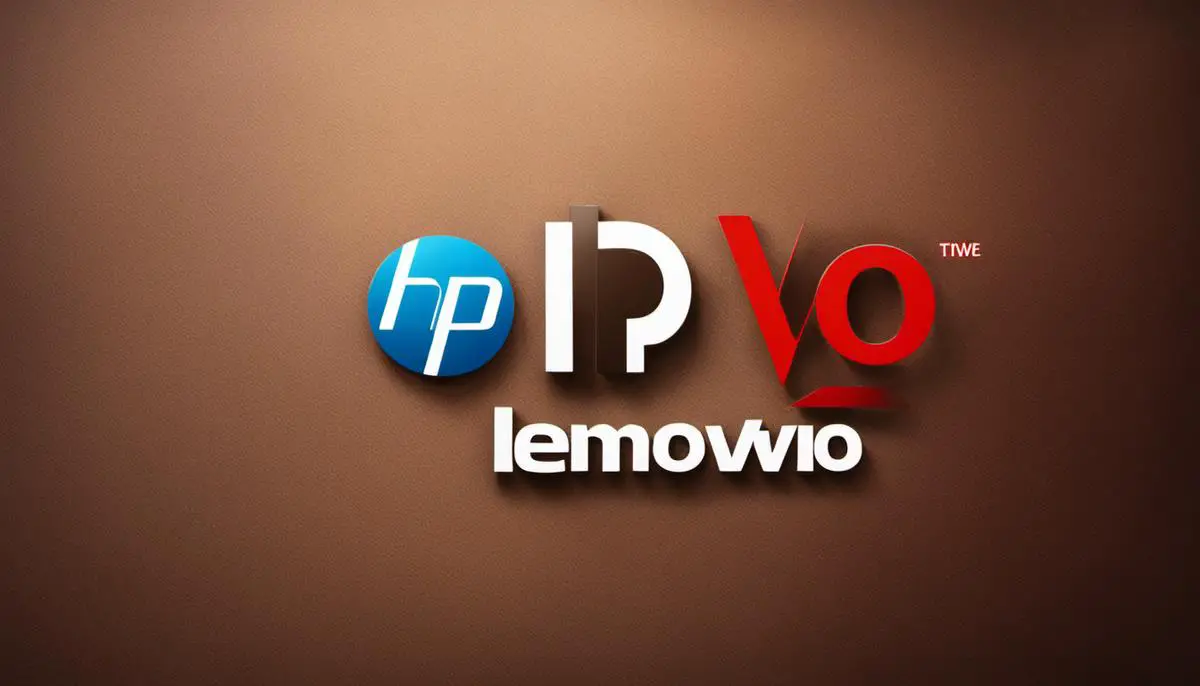In the highly competitive tech marketplace, two names often surface when talking about the top laptop brands worldwide – HP and Lenovo.
Both companies are renowned for their high-quality offerings ranging from personal computers for home and educational use to robust machines for demanding corporate environments.
This analysis aims to provide an objective evaluation of the two brands based on pertinent pointers such as product comparison, customer Reviews, pricing, warranty, and support services.
Company Profiles: HP vs Lenovo
Company Profiles: HP and Lenovo
Hewlett-Packard, better known as HP, was established in 1939. The company was founded by Bill Hewlett and Dave Packard, two Stanford University classmates. Headquartered in Palo Alto, California, HP has grown into an international information technology giant, renowned for its computers, printers, and related services. Their mission is to create technology that makes life better for everyone, everywhere, focusing on the development and implementation of the necessary tools to help businesses and consumers alike navigate the complexities of the digital transformation era.
On the other hand, Lenovo Corporation started as Legend Holdings in Beijing, China, in 1984, and was renamed Lenovo in 2003. It became a multinational corporation that designs, makes, and sells consumer electronics, including laptops, desktops, and workstations, among other products. Lenovo’s vision is to provide smarter technology for all by developing world-changing technologies that create a more inclusive, trustworthy, and sustainable digital society. Despite its Beijing base, Lenovo is considered a global technology leader.
Market Shares
In terms of market shares, HP and Lenovo often compete closely.
- As per IDC’s Worldwide Quarterly Personal Computing Device Tracker 2021 report, Lenovo held the largest market share with 24.5%, while HP Inc. came second with 21.9%.
Lenovo has experienced a remarkable increase in market share since it bought IBM’s PC division in 2005, broadening its range of products and their worldwide presence.
However, HP has been an industry leader for over 80 years, consistently maintaining a large market share. Its strong position is the result of strategic mergers and acquisitions, renowned customer service, and consistent innovation in its products.
Vision, Mission, and Core Values
HP’s vision is to create technology that makes life better for everyone, everywhere. Their mission is to engineer experiences that amaze, and their core values are centered around innovation, integrity, teamwork, and personal accountability.
In contrast, Lenovo’s vision is to create personal devices that customers around the world want to use, make the most of their opportunities, and help customers discover new ways of working and living. Their mission is quite straightforward: they aim to constantly redefine what’s possible. The company’s core values are built on a foundation of customer satisfaction, operational excellence, and product innovation.
When it comes to pinpointing the superior brand out of HP and Lenovo, much depends on individual preferences, specific usage scenarios, and personal requirements.
Each of these brands has its unique strengths; HP enjoys a reputation for manufacturing robust, dependable devices coupled with exceptional customer service. In contrast, Lenovo is hailed for its innovative designs and powerful performance.
Your personal needs and preferences should guide your choice.

Product Comparisons: HP and Lenovo Laptops
A Closer Look at HP vs Lenovo
The high-stakes competition between HP (Hewlett-Packard) and Lenovo has always been one of the most heated discussions in the laptop market.
These two giants offer a broad array of products tailored to cater to diverse needs, whether that be office work, gaming, or personal usage.
HP, an emblem of the tech industry for several decades, is widely appreciated for its top-notch quality, longevity, and unparalleled customer service. HP laptops have not only won the hearts of many with their sleek design but also with their range of innovative features.
Lenovo, an international powerhouse hailing from China, excels in implementing cutting-edge technology while ensuring reliable performance. Lenovo laptops often earn praise for their affordability, impressive battery life, and hard-wearing hardware.
Comparing Popular Models
When comparing the most popular models from both brands, the HP Spectre x360 and the Lenovo ThinkPad X1 Carbon are often considered.
The HP Spectre x360 is a convertible laptop equipped with a powerful Intel Core i7 processor, up to 16GB RAM, and a maximum storage capacity of 2TB SSD. It also features a 4K Ultra HD touch-enabled display, giving the user a brilliant, sharp visual experience. However, it slightly lags behind in terms of battery life, offering up to 13 hours on a single charge.
In contrast, the Lenovo ThinkPad X1 Carbon boasts an impressive battery life of up to 15 hours. It is also designed with an Intel Core i7 processor, up to 16GB RAM, and a maximum of 1TB SSD for storage. Yet, the display is a bit smaller, with a Full HD resolution. It should be noted that ThinkPad X1 Carbon’s durability and reliability are hard to match, owing to its military-grade construction.
Strengths and Weaknesses
Each brand has its respective strengths and weaknesses, which could greatly influence a potential buyer’s decision.
HP’s strengths lie in its superior design, build quality, and customer service. HP takes pride in its elegant and premium designs which are both durable and chic. Moreover, HP’s customer service is often rated as one of the best in the industry, which can be a significant deciding factor for many customers.
However, HP’s primary disadvantage is cost. HP laptops tend to be slightly more expensive than their competitors, which could deter budget-conscious customers.
Lenovo, meanwhile, is praised for its excellent price-to-performance ratio, stellar battery life, and rugged construction. Lenovo laptops are generally affordable without compromising the overall performance and reliability.
The major drawback for Lenovo is the less impressive design. Lenovo laptop designs, though functional and sturdy, are often considered less appealing as compared to those from its competitor, HP.
Conclusion
In the pursuit of deciding which brand, HP or Lenovo, reigns supreme, the ultimate choice falls back to the individual’s specific needs, preferences, and budget. If aesthetics, build quality, and top-tier customer service are high on the priority list, HP may be the favored pick. Alternatively, for those who are more drawn to cost efficiency, dependable construction, and a more enduring battery life, Lenovo could present a more suitable option.

Customer Reviews and Ratings
Delving into Customer Reviews and Ratings: HP Vs Lenovo
To form a deeper comparison of the two brands, examining customer reviews and ratings provides a wealth of insights. These ratings often culled from the experiences of actual users, yield a more rounded understanding of performance capabilities for both HP and Lenovo.
HP’s Portfolio
Even though HP initiated its journey of producing world-known printers, has successfully carved out a reputable niche in the laptop market. Users frequently highlight HP’s thirst for innovation, evidenced in their smart designs and high-grade build quality. Attributes like high-resolution screens, capable processors, and impressive memory performance have not gone unnoticed amongst the HP user community. However, HP is sometimes critiqued for its battery life, and its customer support has received mixed reviews. Although HP laptops occupy a higher price bracket, a majority of users believe the products justify the expenditure due to excellent reliability and longevity.
From a usability standpoint, HP often scoops up favorable reviews, thanks to a straightforward setup process coupled with user-friendly software. These attributes have broad appeal, catering to techno-novices and enthusiasts alike, for both personal and professional purposes.
Lenovo
On the other hand, Lenovo, originally known for their ThinkPad laptops, has expanded into an array of tech products. According to user reviews, Lenovo excels in providing functional, durable, and powerful machines, often at a lower price than HP. Many users have lauded the brand for delivering exceptional value for money. However, some users have reported issues with certain models’ trackpad and keyboard layout.
Lenovo’s product durability tends to gather high praise, with users expressing satisfaction with the brand’s robust build quality that can withstand heavy daily use. Lenovo’s customer support is often rated as above average, with numerous positive anecdotes about prompt service and effective solutions.
Price Analysis
Comparing the prices of the two brands, Lenovo seems to have an advantage over HP. This is primarily due to the powerful features provided by Lenovo devices that come at reasonably lower costs, which have been acknowledged and appreciated by the user base.

Pricing, Warranty, and Support Services
Price Structures of HP versus Lenovo
HP and Lenovo have various pricing structures for their laptop offerings to fit a broad spectrum of users and their spending capabilities. Notably, Lenovo offers a competitively priced range, particularly through their Ideapad series, which is targeted toward students. With typically lower starting prices for their Ideapad and ThinkPad E-series models than HP’s lowest-priced offerings, Lenovo is a go-to for budget-conscious consumers.
In contrast, HP caters to both ends of the spectrum with its moderately priced Pavilion range and the high-end Spectre series. While Spectre laptops are usually on the pricier side, they are loaded with sophisticated features and considered a premium range designed for professionals or users with more demanding needs. They offer excellent performance and an upscale design, justifying their higher price point.
Warranty
Both Lenovo and HP provide standard warranties for their laptops. Lenovo’s standard warranty covers manufacturing defects and hardware issues and lasts for one year from the date of purchase, but it does not cover any software issues. Lenovo also offers an extended warranty that lasts up to three years from the purchase date, providing onsite support and next-business-day service.
HP’s warranty offerings are similar, with a standard one-year limited warranty covering parts, labor, and onsite service. HP also offers an extension of the warranty period with their HP Care Pack, which can extend the warranty for up to three years. It also includes additional benefits such as accidental damage protection and theft recovery.
Support Services
When it comes to customer support, both Lenovo and HP provide multiple channels for users to get help, such as live chat support, email, social media, and forums. They also each have extensive online resources, including support articles, downloadable drivers, and comprehensive FAQs.
HP’s customer support is well-regarded, with HP’s Virtual Agent being a standout support feature. The Virtual Agent can answer a wide range of questions and guide users through troubleshooting processes. If the Virtual Agent can’t solve the issue, it directs users to human support personnel.
Lenovo’s customer support is also efficient, but reviews vary regarding response times and the effectiveness of the support provided. However, it’s worth noting that support experiences can vary widely among users for both brands, depending on the nature and complexity of the issue.
However, in terms of third-party ratings, HP often lands on top. According to a 2020 survey by Laptop Mag, HP ranked second for its tech support, earning particularly high marks for its phone support and social media quick response time. On the contrary, Lenovo landed in the sixth position.
Taking the Final Call
HP and Lenovo are fairly matched in both pricing and warranty, creating a tumultuous decision for potential customers. However, it’s worth noting that Lenovo typically presents a more cost-friendly alternative for those mindful of their budget. Yet if customer service holds the upper hand for you, independent ratings show HP’s support fare better than Lenovo’s. Therefore, your ultimate choice between HP and Lenovo would vary based on personalized factors – your specific requirements, available budget, and individual preferences.

Photo by disruptxn on Unsplash
Conclusion: Which is the Best?
Digging Deeper: Specifications and Features
An in-depth examination of the specifications and features of HP and Lenovo products reveals a kaleidoscope of options, heavily reliant on the specific model in view. Premium products from both brands, such as the HP Spectre x360 or Lenovo Yoga C940, are performance powerhouses fitted with 10th-generation Intel Core processors and sufficient SSD storage.
HP devices often stand out for their superior audio experience, thanks to their synergy with Bang & Olufsen, along with their vivid, high-definition displays. Conversely, Lenovo’s devices are lauded for their sturdy build quality and lifespan. Specific laptop models like the ThinkPad series have even earned a reputation for their military-grade durability.
When the debate shifts to battery life, Lenovo often outruns HP, with select models delivering over 10 hours of runtime on a single charge.
Performance and Reliability
Looking at performance and reliability, both brands deliver in their own right. HP typically offers computers with powerful specifications and they’re known for their high performance in gaming and graphics-heavy processes.
Lenovo, on the other hand, excels in the business and education sector with its reliable, durable, and performance-oriented computers. ThinkPads, in particular, are renowned for their keyboard quality and ergonomic design.
Customer Support and Warranty
In terms of support and warranty, both Lenovo and HP offer standard one-year warranties on their laptops. Both brands also have hefty extended warranties and additional services, for an extra cost. Lenovo stands out with its ‘Accidental Damage Protection’ which covers damages from accidental drops, spills, and electrical surges.
Customer support is a critical aspect of any tech brand. HP has a higher customer satisfaction rating in this regard, and they offer several means of support including a useful online chat feature.
Price Consideration
Price is a determining factor for many users. While both HP and Lenovo offer models towards both ends of the price spectrum, Lenovo usually provides better value for money. Many of their laptops offer an impressive spec-to-price ratio. HP, conversely, is often considered a more premium brand, with higher average prices across their range.
Edge Each Brand Has Over the Other
In summary, both brands have their strengths. HP’s advantages lie in its superior customer service, high-quality audio system, and vivid displays, making it a great option for multimedia enthusiasts and gamers.
Lenovo, on the other hand, is known for its sturdy build quality, impressive keyboards, and value for money, which makes it a solid contender for business users and students who require reliable, long-lasting hardware for everyday use.
Best Brand: HP or Lenovo?
If one has to choose the best brand, it depends on individual use and needs. For those seeking premium quality and are ready to pay higher, HP could be the better choice. But for users seeking excellent performance and durability at a more accessible price, Lenovo stands as the ideal option. Also, Lenovo is the preferred choice for business users and students, while HP is desirable for multimedia, gaming or creative tasks.
Remember, though, that individual models vary greatly within each brand, so it’s always advisable to research and compare specific models before any purchase.

After an in-depth analysis of both HP and Lenovo, it’s evident that both laptop manufacturers deliver high-quality and reliable products, each dominating different aspects. Whether it’s HP’s adaptability with innovative designs and robust performance or Lenovo’s commitment to providing excellent computing solutions and top-notch customer service, choosing between them essentially boils down to personal preferences, specific user needs, and budgetary constraints. Ultimately, it’s the seamless blending of product design, functionality, and the level of customer satisfaction that defines the suitability of a brand. To this extent, both HP and Lenovo demonstrate an unwavering commitment to their craft, making them top contenders in the tech market, thus making the “best” label a subjective concept tied exclusively to particular user requirements, expectations, and experiences.
- Best Laptops for AI and Machine Learning
- Upgrading SSD Storage in the ThinkPad X9-15 Gen 1 Aura Edition
- How Quantum Computing Could Impact Everyday Laptops
- What Is The Difference Between Lenovo’s Pens? (with Part Numbers)
- Legion 5 Laptop Upgrade Guide: Game Like a Pro
- How to Replace Your Laptop Battery: A Step-by-Step Guide
- IdeaPad Gaming 3 Upgrade (Full Specs)
- Shut Down a Lenovo Laptop: Quick and Easy


